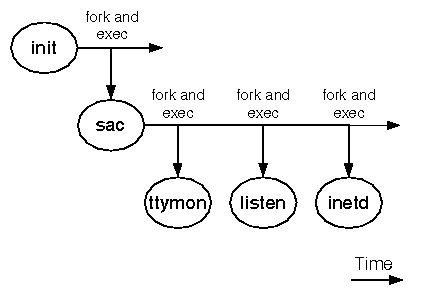The Service Access Controller
The Service Access Controller (SAC)
is the administrative point of control
for all port monitors
(and therefore for all ports on the system).
Its job is to maintain the port monitors
in the state specified by you.
It accomplishes this through these actions:
-
During initialization, the SAC daemon
customizes its own environment
by invoking the
per-system configuration script
supplied with the SAF.
-
Next, the SAC daemon
reads its
administrative file
to determine which port monitors are to be started.
For each port monitor specified,
the SAC interprets
the corresponding
configuration script
(if one exists)
and then starts the port monitor itself.
-
Once the SAC daemon is running,
it polls the port monitors periodically and
initiates recovery procedures if necessary.
Because the SAC daemon is started by the
init(1M)
command during system initialization
(through an entry in
/etc/inittab),
it starts working as soon as you enter multi-user state.
``How the SAC daemon and port monitors are generated''
shows how the init process spawns the SAC daemon
(sac), and in turn, how the SAC daemon
spawns port monitors such as
ttymon, listen and inetd.

How the SAC daemon and port monitors are generated
From time to time you will want to query the SAC;
for example, to check the status of the port monitors.
You may also need to make changes to the port monitors.
For example, you may want to enable a disabled port monitor
or start a port monitor that has been killed.
sacadm(1M)
and
pmadm(1M)
allow you to issue commands to the SAC which,
in turn, communicates with the port monitors.
© 2004 The SCO Group, Inc. All rights reserved.
UnixWare 7 Release 7.1.4 - 22 April 2004

